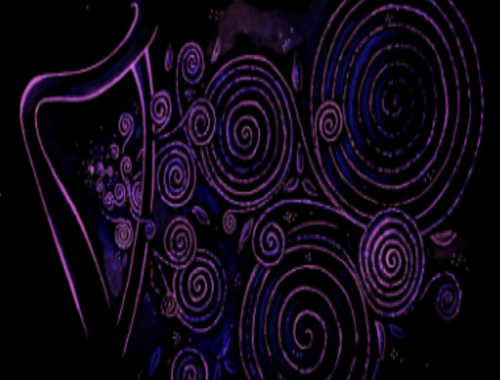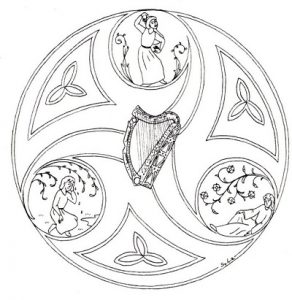
Das Wissen der Druiden umfasst viele unterschiedliche Facetten. Eines der interessantesten und wohl gehüteten Geheimnisse ist die Anwendung der heiligen Klänge in der spirituellen Praxis und in der Heilkunde. Die Arbeit mit Klangwellen stabilisiert das persönliche Schwingungsfeld und fördert die Entwicklung des spirituellen Potentiales nachhaltig in allen persönlichen und beruflichen Bereichen. Die Klang Erfahrung öffnet neue Dimensionen der Wahrnehmung und Individuation.
Durch die Industrialisierung und den Gebrauch immer neuerer Technologien hat sich unsere Welt massiv und nachhaltig verändert. Druidische Energiearbeit und ihre Musik die zu spirituellen und rituellen Arbeiten genutzt wird, ermöglicht eine intensive Rück Anbindung (Religio) an die Gesetze der Natur. In unserer heutigen Zeit überlagern viele künstliche Frequenzen das ursprüngliche atmosphärische Schwingungsfeld unserer Umgebung und unseres Planeten. Unsere Mobilfunknetze und Computer verändern unser Leben und unsere Lebensweise nachhaltig – leider oft zum Nachteil des Menschen wie viele Geomanten, Schamanen und sensitive Personen wissen. Wir versinken in einer Flut von Informationen, die wir nicht mehr verstehen können und verlieren das Gefühl für Einheit und Einklang. So kommt der Begriff „Person“ von per sonare dh im Klang sein. Die Schamanen und Menschen mit der Fähigkeit zur meta Kommunikation haben die Wichtigkeit erkannt mit Klängen, Gesängen und Musikinstrumenten die Einheit mit unseren Lebenskräften zu bestärken. Da die zugrunde liegenden Zusammenhänge bisher nur wenig erforscht wurden (zB in der Bio Akustik) gibt es bisher nur wenig Informationen zu diesem Thema. Ein Vorreiter war der Astronom Keppler der als einer der ersten die Sphären Harmonie der Planeten entdeckte und in seinen Schriften (Harmonia Mundi) beschrieben hat. Heute sind die planetaren Töne die er berechnet hat und die Klangarbeit mit ihren Frequenzen vielen Menschen bekannt und auch die Wissenschaft beginnt nun endlich sie zu erforschen. Trommelkreise haben einen nachgewiesenen Einfluss auf die Biorythmen unseres Körpers und Naturton Instrumente wir die Saiteninstrumente Kantele und Harfe sind aus den alten Kulturen nicht weg zu denken. So ist auch die klassische Druidenharfe auf die natürlichen Klänge als Basis gestimmt. Die Phosphorbronze Saiten entlocken dem Instrument facettenreiche Obertöne und bringt die Menschen auf eine ganz besondere Weise zum Träumen und entspannen – sie lässt uns in die „Anderswelt“ wandern. Durch die Harmonie des Klangfeldes werden die unterschiedlichen Bereiche unseres Körpers zum Klingen gebracht und manch ein Zuhörer kommt in Kontakt mit Wesenhaftigkeiten die in der Naturreligion und dem Schamanismus seit langem als „Geistwesen“ bekannt sind. So sprechen wir beispielsweise davon das wir in einer „guten Stimmung“ sind oder
Erfahrungen im „Einklang“ mit der Natur machen können. Der Klang begleitet uns schon immer. Alle sichtbaren Erscheinungen, Mineralien, Pflanzen, Tiere Menschen und sogar die Himmelskörper sind Schwingung und Klang wie die Weisen aller Völker schon immer wissen.
Die Essenz aller Wesen hier ist die Erde
Die Essenz der Erde ist das Wasser
Die Essenz des Wassers sind die Pflanzen
Die Essenz der Pflanzen sind die Tiere
Die Essenz der Tiere ist der Mensch
Die Essenz des Menschen ist die Sprache
Die Essenz der Sprache ist das heilige Wissen
Die Essenz des heiligen Wissens ist der Klang
Die Essenz des Klanges ist Awen

Das Wyrd Gewebe das alles was existiert vereint verbindet sogar Vergangenheit und Zukunft und vereind sie letztendlich in der Gegenwart wie die Quantenphysik herausgefunden hat. Die älteste Art Klänge zu bilden treffen wir in der Obertonmusik und den weniger bekannten Untertönen. Sie werden genutzt um die Wahrnehmung zu verbessern, den Energiefluss zu kanalisieren und mit den göttlichen Ebenen in Kontakt zu treten. Der Urklang ist das große Mysterium des Kosmos – All Eins zu sein. Das Symbol dafür ist der heilige Kreis oder in unserer Tradition der sogenannte Graal. Der Kreis rundet einander widersprechendes, gleicht die Gegensätze aus und verbindet sie. Frederic Fester hat aufgezeigt das die Prozesse und Denkweisen der Kybernetik unserer herkömmlichen Logik zuwider laufen. Prozesse entwickeln sich nicht gradlinig auf der Basis der Logik eines Aristoteles (Ursache- Wirkung und Vergangenheit – Zukunft ) sondern in sogenannten Regelkreisen. Anders gesagt -Ursache und Wirkung sind abhängig vom eintreten in diesen kreisförmigen Prozess und hängen vom Einstieg in den Kreis ab. Das Denken und die Planungen solcher Regelkreise sind heute in Ökologie Medizin und Biologie weit verbreitet. Sie sind viel energiesparender und effizienter und wirken sich langfristiger und ökonomischer aus. Das analoge Denken eröffnet uns die Zusammenhänge im Grossen und Ganzen zu verstehen, während monokausale Betrachtungen nur bedingt geeignet sind das gesammte Sein als Einheit zu erfahren.
Unsere Planeten bewegen sich nicht nur in elliptischen Bahnen sondern harmonieren in Ihren Proportionen mit unserer irdischen Musik und deren Obertonreihen. Diese harmoniakalischen Gesetze klingen im großen Makrokosmos genau so wie im kleinen Mikrokosmos. Die Grundlegenden Gesetzmässigkeiten finden wir in der Musik in den Obertonreihen, den Intervall Proportionen, die alte Einteilung des Oktavraumes in zwölf Halbtonstufen sowie die Unterscheidung in Dur und Moll Proportionen und die Dominanz der 1:2 Proportion der Oktave. Diese akkustischen Verhältnisse haben einen universellen Charakter. Als Ordnungsprinzipien gestalten sie den Kosmos genau so wie unsere menschlich irdische Musik uns beeinflusst.

Der Musikwissenschaftler Wilfried Krüger und der französische Atomphysiker Jean E. Charon haben die Fülle dieser harmoniakalen Strukturen entdeckt und untersucht. So zeigt das Sauerstoffatomkern Protonen Modell 12 Stufen und die Tonleiter und die Spins markieren exakt die Halb – und Ganztöne. Auch das Phosphoratom, welches das größte der menschlichen DNS ist, bildet eine Tonleiter, in der die Klänge der 15 Protonen im Kern vom tiefen g bis zum fis` zu finden sind. Auch hier markieren die Spins exakt die Halbtöne. Prof Dr Rudolf Haase von der Hochschule für Musik und harmoniakale Grundlagen Forschung lehrt das unser gesammtes periodisches System auf den Tönen c`,c„`,d„„ und C „„`basiert- also vorwiegend auf den höheren Oktaven des Grundtons.
Rudolf Steiner hatte sich schon in den 20er Jahren ausführlich mit den Grundtönen ,besonders dem C 128 Hz auseinandergesetzt. Aussagen von ihm belegen die besondere Bedeutung.
- .Die Schwingung C 128 Hz hat. subjektiv gesprochen, beim Anhören etwas wie eine Wärmehülle um sich“.
- C 128 Hz = Sonne
- Heilpädagogen bemerkten, das sich die Kinder mit C 256 Hz als Anfangston ohne Schwierigkeiten in den Liedmelodien zurechtfinden und zu dem Anfangston zurückkehren konnten, während bei der Verwendung von A 440 Hz dies selten der Fall war.
Die Gruppierungen dieser wunderbaren harmoniakalen Symetrie finden sich in den sogenannten platonischen Körpern (Tetraeder,Oktaeder,Hexaeder (Würfel), Ikosaeder und Pentagondodekaeder wieder. Diese fünf Körper sind alle aus regelmässigen Vielecken zusammen gesetzt. In der Anzahl der Ecken und Kanten dieser Körper kommen folgende Zahlenreihen vor..4,6,8,12,20, 30. In einer Obertonreihe auf c bilden sie die töne c„,g„c„`,g„`,e„„ und h„„`.
Neuere Forschungen in der Bioakkustik haben ergeben, das Pflanzen verkümmern, wenn sich Ihre Klänge disharmonisch zu umgebenden Pflanzen verhalten. In der Wissenschaft ist dieser Effekt der Empfindungsfähigkeit von Pflanzen als Backster Effekt bekannt. Pflanzen können die Gedanken von Personen die sie pflegen und wässern zum Teil auf tausende von Kilometern empfangen und darauf reagieren. Die amerikanische Biologin Dorothy Retallack spielte einer Anzahl von gleichen Pflanzen Töne vor. Sie fand heraus, das Pflanzen denen man jeden Tag 8 Stunden unablässig den Ton f vorspielte nach 2 Wochen eingegangen waren. Eine andere Versuchsgruppe der man den gleichen Ton 3 Stunden mit längeren Unterbrechungen vorspielte, wuchs besser und gesünder als Kontrollpflanzen denen man keine Töne vorgespielt hatte. Weil der menschliche Körper nach harmoniakalischen Gesetzen gebildet ist kam man schon in der Frühzeit auf den Gedanken Krankheiten durch Musik zu heilen. Jede Krankheit ist ein musikalisches Phänomen. Überall ist es der Ton der die Welt ordnet und Ihr Schönheit gibt. Sterne und Planeten , die Kristalisation und Ausbildung von Pflanzen, Tier- und Menschenkörpern bis in den atomaren Bereich werden durch Ton und Klang geformt. So verwundert es auch nicht das der gute Gott der Kelten – der Dagda eine Zauberharfe besass mit der er Wunder vollbringen konnte.
Der Dagdha (Dagda) war der höchste Druide und König der sagenumwobenen Tuatha De Danann, der Feenrasse Irlands und Schottlands. Er spielte eine verzauberte Harfe, genannt Una, welche drei Arten von Musik hervorbrachte: Geantrai, Goltrai und Suantrai. Während der Schlacht von Moytura, die zwischen den Tuatha de Danann und den Fomorianern, ihren alten Feinden, ausgefochten wurde, wurde die Zauberharfe des Druidenkönigs gestohlen. Der Dagda nahm die Spur der Harfe bis in die Halle der Fomorianer auf, wo er sie an der Wand aufgehängt vorfand. Die Macht des Dagda war so groß, dass die Harfe von selbst durch die Halle in die Hände ihres Meisters schwebte, als dieser zu singen begann. Noch bevor die Fomorier etwas tun konnten spielte der Dagda die erste Art von Musik, Geantrai (Fröhlichkeit), was alle Anwesenden dazu brachte unaufhörlich zu lachen und zu tanzen. Als nächstes spielte er die zweite Form, Goltrai (Traurigkeit), und alle begannen unkontrollierbar zu weinen. Dann spielte er die dritte Art von Musik, Suantrai (Schlaf), und alle Anwesenden fielen in einen tiefen Schlummer. Vorsichtig durchschritt der Dagda die Reihen seiner laut schnarchenden Feinde und entkam schnell mit seiner magischen Harfe. (Walton, 1992) In einer weiteren Legende hatte der Dagda einen eigenen Barden, Uaithne, welcher der Gemahl der Flussgöttin Boand war (der heilige irische Fluss Boyne). Als Boand ihr erstes Kind gebar, war es eine schwere Geburt und sie schrie vor Schmerz. Um ihre Schmerzen zu lindern, spielte Uaithne die heilende Harfe des Dagda. Und als sein erster Sohn geboren war, nannte er ihn Goltrai, nach den Schmerzen seiner Mutter. Die Musik, die Uaithne bei seiner Geburt gespielt hatte, wurde demnach Goltrai genannt. Die Geburt von Boands zweitem Sohn war viel leichter und sie lachte dabei vor Freude, und so wurde der zweite Sohn Geantrai genannt. Die Musik, welche Uaithne bei seiner Geburt gespielt hatte kannte man von da an als Geantrai. Die dritte Geburt war die leichteste von allen und die Flussgöttin schlief zu den Harfenklängen ihres Gemahls ein während sie ihren jüngsten Sohn gebar, den Uaithne Suantrai nannte. Die Musik kannte man von nun an als Suantrai. Alle drei Söhne wurden berühmte Barden wie ihr Vater und durch sie nahm die Harfentradition in Irland und Schottland ihren Anfang. (Walton, 1992)
Als Kammerton für die heutige Musik wurde der Ton A bei 440 Hz festgesetzt (durch politische Entscheidungen in den 50er Jahren). Diese Frequenz hat aber keinen Bezug zur Natur. Es gibt hingegen den natürlichen Kammerton C (256 Hz), der einem Kammerton A bei 432 Hz entspricht. Ohne großen Aufwand ist es heute möglich, jedes Musikinstrument auf C 256 Hz oder A 432 Hz einzustimmen und damit jede Form von Musik auf der Basis von 8 Hz zu spielen und zu hören. Dr. Robert Beck, ein Atomphysiker, ist um die ganze Erde gereist, um die Gehirnströme von Heilern zu messen. Er fand heraus, daß alle Heiler während ihrer Heilarbeit das gleiche Gehirnwellenmuster von 7,8 -8 Hz aufweisen, unabhängig von Ihrer Methode oder den Widersprüchen zwischen ihren Methoden. Forschungen im Institute of Heartmath in USA ergaben, daß das Herz im Zustand der Verliebtheit auf 8 Hz schwingt. Das entspricht der Hauptresonanzfrequenz der Erde (Schumannfrequenz) und dem Bereich der Alphawellen im Gehirn. Ein liebendes Herz, ein entspannter Geist und das elektromagnetische Schwingungssystem der Erde liegen auf einer Wellenlänge.
Es schläft ein Lied in allen Dingen
Die da träumen fort und fort
Und die Welt fängt an zu singen
Triffst Du nur das Zauberwort.
(Joseph von Eichendorff)

